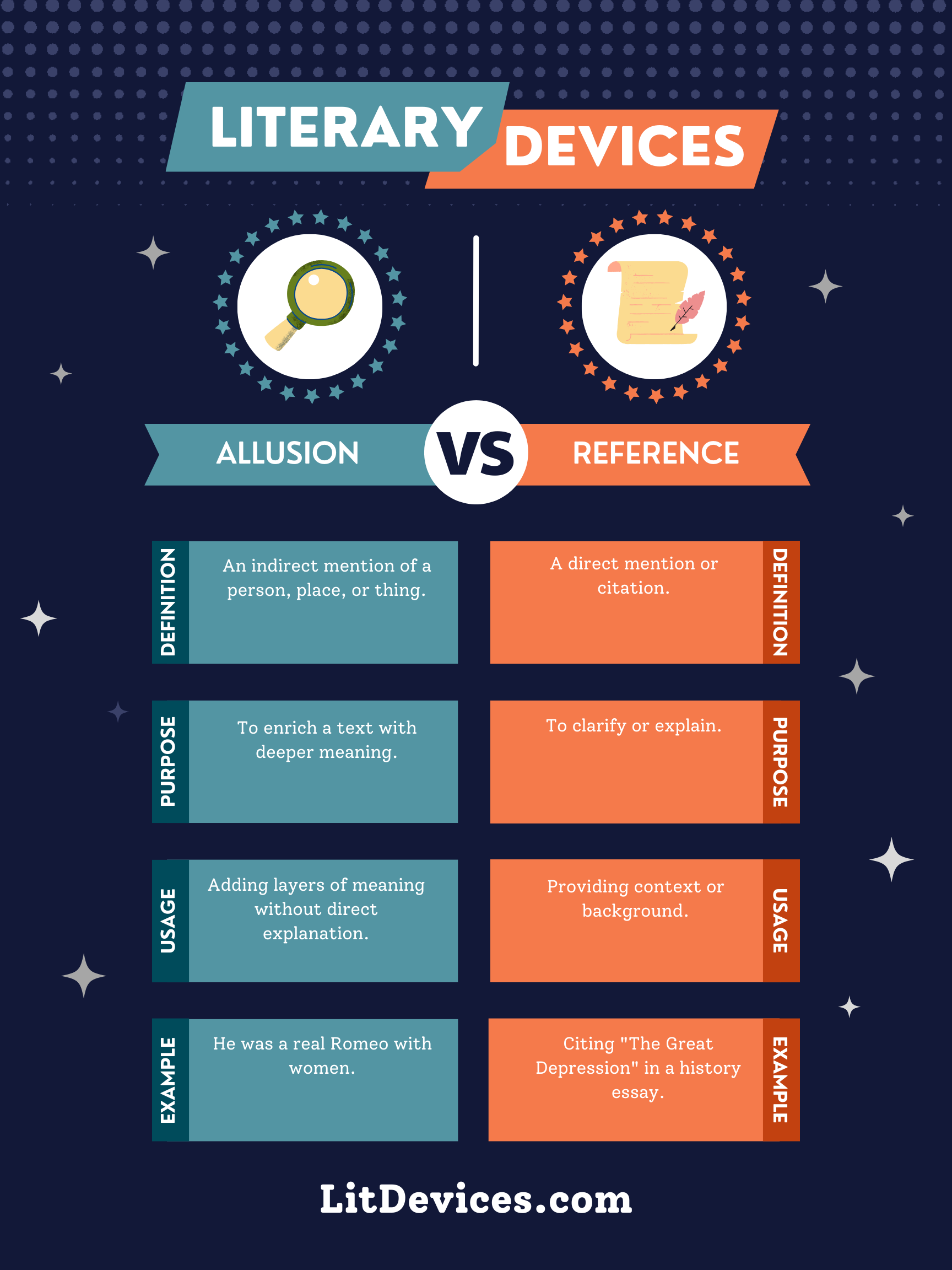Allusion is an indirect mention of a person, place, thing, or idea; Reference directly mentions or cites these elements.
Allusion
Allusion is a subtle or indirect reference to a person, place, thing, or idea of historical, cultural, literary, or political significance. It does not describe in detail the person or thing to which it refers. It’s more about suggesting or calling something to mind without mentioning it explicitly.
📚 Example: “He was a real Romeo with the ladies.” This sentence alludes to Romeo from Shakespeare’s “Romeo and Juliet,” suggesting that the person is romantic or lovesick.
Reference
Reference, on the other hand, is a direct mention of or citation to a source, person, place, event, or thing. It’s explicit and clear, leaving no doubt about what is being mentioned.
📖 Example: “According to the World Health Organization, healthy eating is vital for maintaining physical fitness.”
Summary
| Literary Device | Definition | Purpose | Usage | Relevant Examples |
|---|---|---|---|---|
| Allusion | An indirect mention of a person, place, thing, or idea, often implying a shared cultural or literary background. | To enrich a text by invoking the associations and connotations of the alluded-to object or text. | Common in literature and art to suggest connections or evoke emotions. | Referring to someone as a “Scrooge” to imply miserliness, alluding to Dickens’ character. |
| Reference | A direct mention or citation of a source, providing clear details. | To provide evidence, illustrate a point, or clarify the source of information. | Used in academic writing, journalism, and non-fiction to acknowledge sources. | Citing a scientific study to support an argument in an essay. |
Writing Tips
For writers looking to effectively use allusion or reference:
- For Allusion: Make sure your audience has the background knowledge to understand the allusion. It’s a great tool for adding depth and resonance to your writing, but it can be lost on readers unfamiliar with the reference.
- For Reference: Be clear and precise. When citing sources or making references, accuracy is key to maintain credibility and authority. Follow the appropriate citation style for your field.
🖋 Example for Allusion: “She had the patience of Job.” This assumes the reader knows about Job’s story from the Bible, interpreting patience as a significant virtue.
🖋 Example for Reference: “In his 1999 study, Smith argues that…” This explicitly directs the reader to a particular source for further information.
FAQs
What is the main difference between an allusion and a reference?
The main difference is subtlety; allusions imply without stating explicitly, while references clearly state or cite the source or subject.
How can I decide whether to use an allusion or a reference?
Consider your audience and purpose. Use allusion to add depth and literary resonance for a knowledgeable audience; use reference when clarity and accuracy are needed, such as in academic or professional contexts.
Can an allusion function as a reference?
While an allusion can point to a source or idea, it does so indirectly and relies on the reader’s ability to recognize and interpret it, unlike a direct reference.
Exercise
Determine whether the following are examples of allusion or reference:
- “Like Achilles, his heel was his pride.”
- “The study by Doe (2020) shows a significant correlation between sleep and memory retention.”
- “This situation is quite Orwellian, isn’t it?”
- “Refer to the book ‘The Elements of Style’ for tips on concise writing.”
Answers:
- Allusion
- Reference
- Allusion
- Reference
Interesting Literary Device Comparisons
- Metaphor vs. Simile: Both compare two different things, but metaphors do so directly, while similes use “like” or “as.”
- Irony vs. Sarcasm: Irony involves a contrast between expectations and reality, while sarcasm is a form of verbal irony that’s often biting or mocking.
- Hyperbole vs. Understatement: Hyperbole exaggerates for effect, whereas understatement minimizes the importance of what’s being described, often for comedic or emphatic effect.
Exploring these comparisons can deepen your understanding and enhance your use of literary devices in writing.

